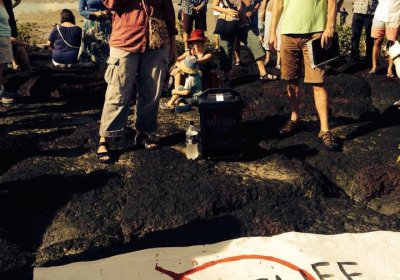Kumanjayi Langdon, 59, from Yuendumu in Central Australia, died of heart failure in Darwin Police Watch House on May 21 — “on a concrete bench with two strangers” — three hours after being taken into custody following a paperless arrest “for drinking in a regulated place”.
At the inquest into Langdon’s death, Northern Territory Coroner Greg Cavenagh found he died from natural causes but should have been able to die in freedom, with his family and friends.
"In my view Kumanjayi Langdon had the right to die as a free man," Cavanagh said.
Gulumerrdgen/Darwin
The great power of Vincent Lingiariʼs story is that it teaches us how this land sings to us all, how it holds us and nurtures us. This is the common ground that we share.
When the Gurindji leader and his people walked off Wave Hill Station, camping by the Victoria River and then eventually by Wattie Creek at Dagaragu almost half a century ago, they understood that the land was their birthright and their destiny.
A group of Free West Papua supporters attended a morning tea fundraiser in Darwin on August 2. The special guest was foreign affairs minister Julie Bishop. We wanted to meet her to discuss human rights in West Papua.
Bishop was the key speaker. She took a few questions from the crowd but, although she knew I wanted to speak to her, she ignored me every time.
Last Sunday I was arrested while attempting to obstruct war rehearsal operations at Lee Point.
Despite standing in the water off Lee Point, right in the path of the US Navy LCAC amphibious craft, it continued to rush back and forth past me until I was removed from the area by water police. Its final pass, before I was plucked from the water by police, came so close that the bow wave knocked me over. I was disappointed that I was unable to present enough of a hindrance to at least delay them while they waited for my removal.
Over the weekend of July 4 and 5, West Papuan solidarity activists visited Darwin to work with Aboriginal people to protest and organise against the Australian government’s complicity in atrocities committed by Indonesian forces against independence activists in West Papua.
The weekend included forums, band nights and a smoking ceremony to commemorate the Biak massacre in 1998. On July 6, the participants set up a protest embassy on the lawns near Northern Territory Parliament House.
 Clashes erupted on April 15 at the Wickham Point detention centre in Darwin when refugees resisted attempts to send them back to the Australian-run concentration camp in Nauru where they have suffered serious human rights abuses.
Clashes erupted on April 15 at the Wickham Point detention centre in Darwin when refugees resisted attempts to send them back to the Australian-run concentration camp in Nauru where they have suffered serious human rights abuses.
Legal experts have criticised new child protection laws pushed through Northern Territory parliament on February 18 for not including safeguards to protect Aboriginal culture and risking a repeat of the damage done to the Stolen Generations.
The new legislation allows children who are removed from their parents by the Department of Children and Families to be placed on Permanent Care Orders, which would mean that their carers would have control over most decisions to do with the child, free from judicial or DCF review.
The Darwin Asylum Seeker Support and Advocacy Network released this statement on February 27.
* * *
The Darwin Asylum Seeker Support and Advocacy Network (DASSAN) has called on the government to immediately halt all transfers of asylum seekers to offshore detention centres until the report into allegations of sexual abuse on Nauru has been released.
The Moss Inquiry report was provided to the Minister for Immigration and Border protection on February 9, but its findings have not been made public, and there has been no timeframe provided for its release.
The Refugee Action Coalition released this statement on February 5.
***
Fifteen Iranian asylum seekers are on their 19th day of hunger strike in Darwin’s Wickham Point detention centre.
Meanwhile, Martin, who has been on hunger strike since November last year, is very weak and close to death.
Martin and the 15 are part of a group of about 35 Iranian asylum seekers who are being held indefinitely in detention. The government is unable to remove them to Iran because the Iranian government refuses to accept forced removals from Australia.
The Northern Territory government released the draft report of the independent Review of Indigenous Education in the Northern Territory on February 7. The government’s website says the review aimed to “get an informed understanding of the impact of current programs and initiatives”.
If the report’s recommendations are indicative of government intent, education for remote Aboriginal children in the NT looks set to suffer more blows.
Hundreds of residents rallied on January 26 in response to a proposal to build a large residential island between 200 metres and one kilometre off Nightcliff Beach.
The proposal, dubbed “Nightcliff Island”, was revealed in Northern Territory parliament in June last year. Approval has only been given for exploration at this point but environmentalists are concerned about the impact on fauna-rich mangroves in the area.
- Previous page
- Page 5
- Next page








